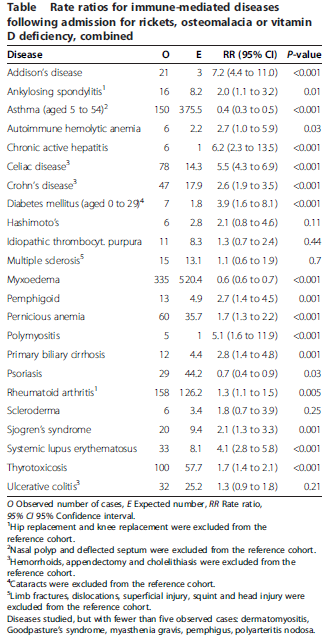Inadequate Vitamin D May Increase Risk of Certain Rheumatic Diseases
While substantial evidence already shows several genetic and environmental elements factor into immune-mediated rheumatic disease susceptibility, a recent review of hospital admissions data suggests vitamin D deficiency can single-handedly elevate a patient's risk of developing certain chronic conditions within that group of disorders.

While substantial evidence already shows several genetic and environmental elements factor into immune-mediated rheumatic disease susceptibility, a recent review of hospital admissions data suggests vitamin D deficiency can single-handedly elevate a patient’s risk of developing certain chronic conditions within that group of disorders.
For their study published in the July 25, 2013, edition of BMC Medicine, Sreeram V. Ramagopalan, PhD, and colleagues from the University of Oxford analyzed the records of 19,679 patients admitted to National Health Service (NHS) hospitals for vitamin D deficiency or its two related conditions known as rickets and osteomalacia in order to determine potential associations with various immune-mediated diseases.
The researchers found that after hospital admission for any one of those three vitamin D-related conditions, patients had significantly higher risks of developing a number of immune-mediated disorders, including Addison’s disease, ankylosing spondylitis, autoimmune hemolytic anemia, chronic active hepatitis, celiac disease, Crohn’s disease, diabetes mellitus, pemphigoid, pernicious anemia, primary biliary cirrhosis, rheumatoid arthritis, Sjögren’s syndrome, systemic lupus erythematosus, and thyrotoxicosis. (Table)

Among patients admitted to NHS hospitals for rickets in particular, the authors discovered that “celiac disease had a substantially increased risk,” and among those admitted for osteomalacia specifically, “the rate ratios for Addison’s disease and celiac disease were particularly high.”
“Previous studies have linked inherited forms of rickets with multiple sclerosis and type 1 diabetes, but no study has attempted an analysis similar to the one we present here,” the authors wrote. “Further studies should look at individual immune-mediated diseases in greater depth to confirm or refute the findings and investigate mechanisms behind any association, (though) regardless of the direction of causality, the fact that individuals with immune-mediated disease are at risk of vitamin D deficiency is of note to ensure they are made replete to support adequate bone health.”
Interestingly, the investigators found considerable protection against the chronic respiratory disorder known as asthma and the Graves’ disease hallmark known as myxedema in patients admitted for vitamin D deficiency, osteomalacia, or rickets. However, they pointed out that earlier research found higher levels of vitamin D in childhood may increase the risk of asthma.